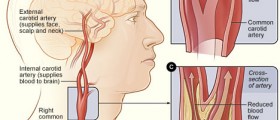
Information on Pulsatile Tinnitus
Pusatile tinnitus is a medical condition in which a person experiences a rhythmical noise inside the ears which beats in time with the pulse. The way the noise is perceived may be different from person to person.
Pulsatile tinnitus is one of the uncommon forms of tinnitus and it is usually caused by hypertension, abnormal circulatory passages, heart murmur, Eustachian tube disorder or glomus tumor. Luckily enough, the condition may be treated fairly easily.
Certain cases of pulsatile tinnitus may also be caused by changes in the blood flow of the large circulatory passages in the neck and base of the skull or perhaps the smaller blood vessels which are located in the ear itself.
Blood flow can be compromised by strenuous exercise or perhaps certain severe cases of anemia. Blood flow can also get increased locally when a blood vessel gets narrower than it normally should be.
Blood flow may become turbulent in the condition widely known as the hardening of the arteries. In order to diagnose pulsatile tinnitus properly numerous tests are required. Those tests may even include checking the pressure inside the cranium.
Medical imaging is required for most patients who suffer from pulsatile tinnitus. It consists of Ultrasound, angiography, CT scanning, magnetic resonance angiography, and magnetic resonance scanning.
Causes and Treatment
There are numerous different factors and medical conditions which may be potential causes of pulsatile tinnitus. One of the most common causes of pulsatile tinnitus is arteriovenous malformation which is actual an abnormal group of circulatory passages that sometimes can occur inside the head and they are usually located in the area that surrounds the auditory nerve.
Another potential cause of pulsatile tinnitus can be carotic artery-cavernous sinus fistula which is actually an abnormal connection that occurs in the cranial cavity between the venous pool and the large artery.
It is usually triggered by severe head injuries. Chronic infections and inflammations of the middle ear can also trigger pulsatile tinnitus in certain cases. Sometimes the fluids can get accumulated behind the middle ear which can also lead to pulsatile sinnitus.
Vascular glomus tumors can get developed in the middle ear and be the cause of pulsatile tinnitus among other things. The tumors can only be corrected by surgical procedure.
Fatty deposits in the inner lining of the arteries may obstruct the flow of blood and trigger pulsatile tinnitus. Pulsatile tinnitus is treated by treating its specific cause.

















Your thoughts on this
Loading...